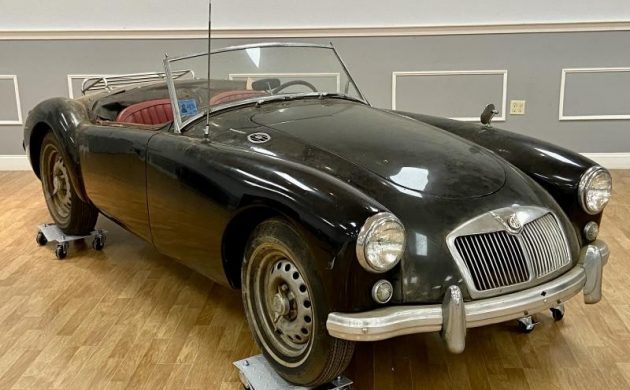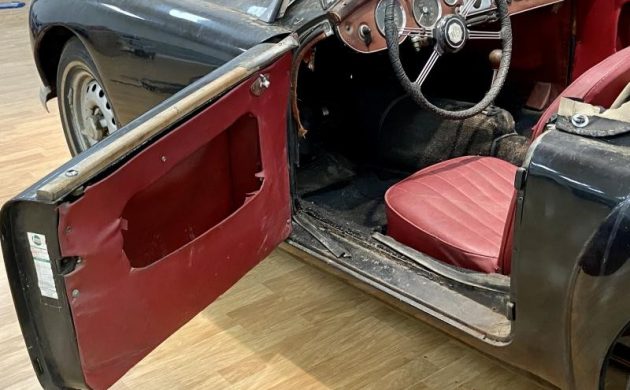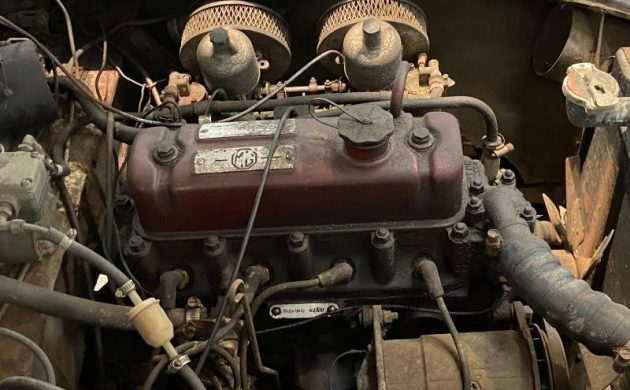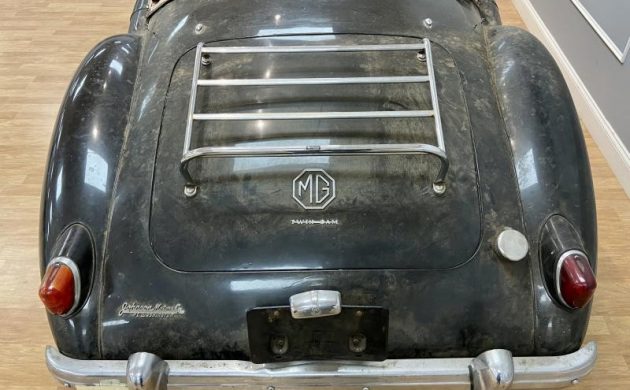Just as there can be times, as blood mixes with grime and 40-weight, when we might dramatically and passionately expound on the parentage of whatever engineer decided that bolt needed to be that close to the frame, so there are quiet moments when we pause to consider the deep questions of life. For example, is an MGA still a Twin Cam if it does not, in fact, have twin cams? If you feel the need to explore this mystery in greater detail, I invite you to consider this 1959 MGA, currently located in Brookline, New Hampshire. Advertised here on liveauctioneers, at the time of writing the bid has climber to over $10,000. No need to rush, though, as there are over 24 days left before the auction’s close. Many thanks to Brian Earley for this tip!
When the MGA was introduced in 1955, it was, in many ways, a radical departure for MG. Gone was the pre-war styling of the TC and TD, and the incremental updates of the TF were abandoned for a completely new take on how an MG should look. The new car was successful both on the track and off, with appearances at Le Mans and strong interest from the buying public. Yet the 1,489 cc BMC B-series engine traced its origins to the Austin A40 Devon, which few would ever mistake for a sports car. It was capable, producing around 70 bhp and pushing the car to sixty in sixteen seconds. But it was not startling.
That was for the Twin Cam. A high-compression DOHC aluminum head, with displacement increased to 1.6L, would be rated at 108 bhp, bringing top speed to 113 mph and dropping the zero to sixty time to nine seconds. To add stop to the engine’s go, the car received disc brakes on all four wheels, and knock-off wheels told the other drivers what was under the bonnet– in case you went by a little too fast for them to catch the badging. For 1958, this sort of performance was phenomenal. Unfortunately, it came at a cost. The engines are famous for being problematic, with pinging and burnt oil being common issues. Lowering the compression helped somewhat, but the Twin Cam would only be offered for three years: 1958, 1959, and 1960. Only 2,111 roadsters and coupes were built.
This may very well be one of them. It definitely has the badging and the distinctive knock-off steel wheels. Additional photos at the auctioneer’s website reveal that the disc brakes are also present. On the other hand, sadly the original engine is gone and the seller reports that the build plate is too corroded to read. Still, these flaws may make this example more attainable for the savvy collector or the ardent devotee of the marque.







Why call it a twin cam when the original motor is gone??
Mike, you are spot on, may have been built as a twin cam, but not now.
Tiger Ty
It’s a model name associated with the original spec of the car. Is a GTO not a GTO if it’s had a replacement engine?
After twin cam production stopped I believe they made a version that had the pushrod engine but all the other goodies like disk brakes. I was told that those hybrid cars are very desirable and this may be one of them.
It has a twin cam heater box.
That would be the MGA Deluxe. But those cars used only the 1600 and 1600 Mk II bodies, not the 1500 body this car has, so it’s not one of those.
Passed on the chance to buy a MkII Deluxe back in 1975. Had no idea what it was or that such a model even existed but later learned it was the rarest MGA made. And of course it is worth big bucks these days.
Worked on one of these many years ago, the original engine was also gone and we put a Fiat twin cam in it, along with the 5 speed. Actually worked very well and I am not one for engine swaps.
What is the “fuel pump” mounted near the heater box? Never seen that. Only the tick tick SU pump.
Lots of MGA action here.
https://www.youtube.com/watch?v=AMOyIDK_Mq4
There were about 400 Deluxe MGA cars made – not advertized as such – left-over Twin-cam cars with all the Twin cam features except a push-rod engine. They are the second-most expensive MGA’s out there.
The DeLuxe was a run-out model using leftover components intended for real Twin-Cams. This appears to be a Twinkie whose blown motor was replaced with the standard MGA push-rod engine.
The BMC B-engine was a good and sturdy engine and parts are still wideley and plentifull available. However, the Twin Cam version of this engine was quite worrisome and utterly unreliable. That’s why BMC stopped production of this ill fated engine. The then new 1622CC Twin Carb and certainly the 1798CC Twin Carb delivered ample power for these MG’s. I think 99% of the Twin Cam engines were dead before 1965.
A friend of mine owned and raced his “Twin Cam” in what was then Southern Rhodesia, and his engine never missed a beat principally because he drove it on 100 Octane (Avgas) whether he raced it or drove it on the street. The cars the general public had to use had to run on standard 93 octane fuel and those were the ones that gave trouble.
My understanding is that the problems of the twin cam were solved years later, so owning one today isn’t an issue.
I have also seen an MGA with a replacement engine from a Honda S600 which appeared to be a really cool, high performance replacement with better performance than a twin cam. Given the TC on this one has vanished, this would be a S600 candidate.
I agree with Graham Line that this MGA is a real twin cam, that got a standard MGA powerplant due to the problems already mentioned. I have read, though, that nowadays all the parts to make an original twin cam engine run properly exist, and that most original MGA twin cams left, run much better now than they ever did originally. However, even if a real MG twin cam motor could be sourced for this car, it wouldn’t be numbers-matching…so I am not sure that it would be worth the trouble. I would recommend restoring the car so that it looks nice and runs well, while the original twin cam badging should be left as part of the car’s originality…and it would also make for plenty of conversations, either at car shows or in the street.
Good point Bill,
The fuel pump on the MGA is normally back near the right rear lever shock if I remember correctly – a quick look in one of the catalogs will correct me in short order.
Maybe the people that took the twin cam motor out, placed a fuel pump up front because the original was not working or they wanted it up front.
Apparently the problem with the twin cam engine was that the natural vibration frequency of the carbs was the same as the engine vibration so that the carbs would vibrate so much that the gasoline would froth in them at speed. This caused them to briefly run extremely lean and be of course lose power and stop their vibration until the engine got back up to the speed and load conditions that caused the vibration. Rinse and repeat. Eventually the super lean conditions under full load would destroy the engine.
Of course since this was intermittent under full load at speed it was really hard to diagnose and the engines were scrapped and replaced with pushrod engines.
The cure was ludicrously simple. Just put a softer spacer between the carbs and the manifold or add some dampening weight to the carb.
A real tragedy that MG never fully recovered from.
The engine itself was brilliant and the 1957 MG EX 181 land speed record car used a 1.5 litre twin-cam, supercharged MGA engine that had been tuned to run on 86% methanol with a little nitrobenzene, acetone and sulphuric ether to make 300hp at 7,000rpm.
Stirling Moss drove it 245.64mph in 1957 and Phil Hill took the car to a top speed of 254.91 in 1959.
Just a bit shy of Moss and Hill. I recall being glued to the the passenger seat of Tom Prichard’s red ’59 Twin Cammer coming down Highway 41 from Yosemite (with the top stowed) one night and pegging the speedo needle off the high beam light . I could actually feel the hairs being plucked from my head. Whatta rush!
Just looking closely and magnifying the photos on the sale site, my eyes tell me that right the way around the bottom of this car, it is rotten. I love MGAs but all I see is a whole world of pain under that black paint.